Books
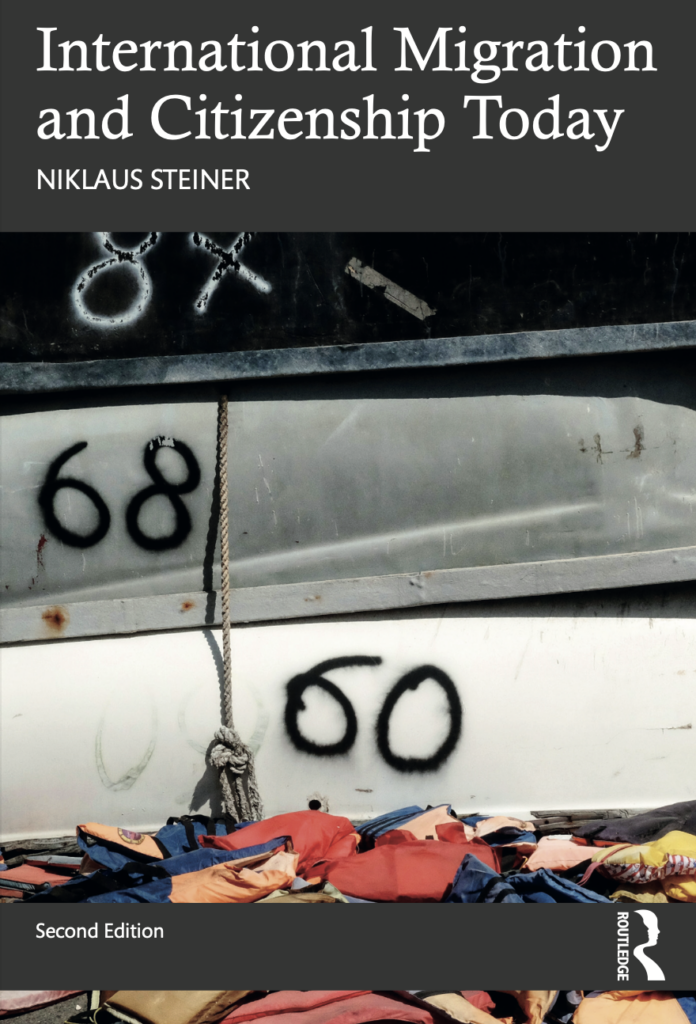
This completely revised and updated textbook explores the moral, economic, political, and cultural dimensions of the movement of people across international borders. In style and substance, this book is designed to spark thoughtful discussions and to challenge students to draw their own conclusions to questions such as: How should democracies balance the rights of immigrants with those of citizens? What exactly constitutes persecution and how should we define a refugee? How should democracies allocate citizenship? Can and should a distinction between voluntary and forced migration be made, and does one group of migrants deserve admission more than the other? What does a reasonable border policy look like? The rise of populism, the vote for Brexit, and the unprecedented flow of refugees around the world are all evidence that these questions remain highly salient, controversial, and unresolved.
International Migration and Citizenship Today. 2nd edition Niklaus Steiner, (London: Routledge, 2023).
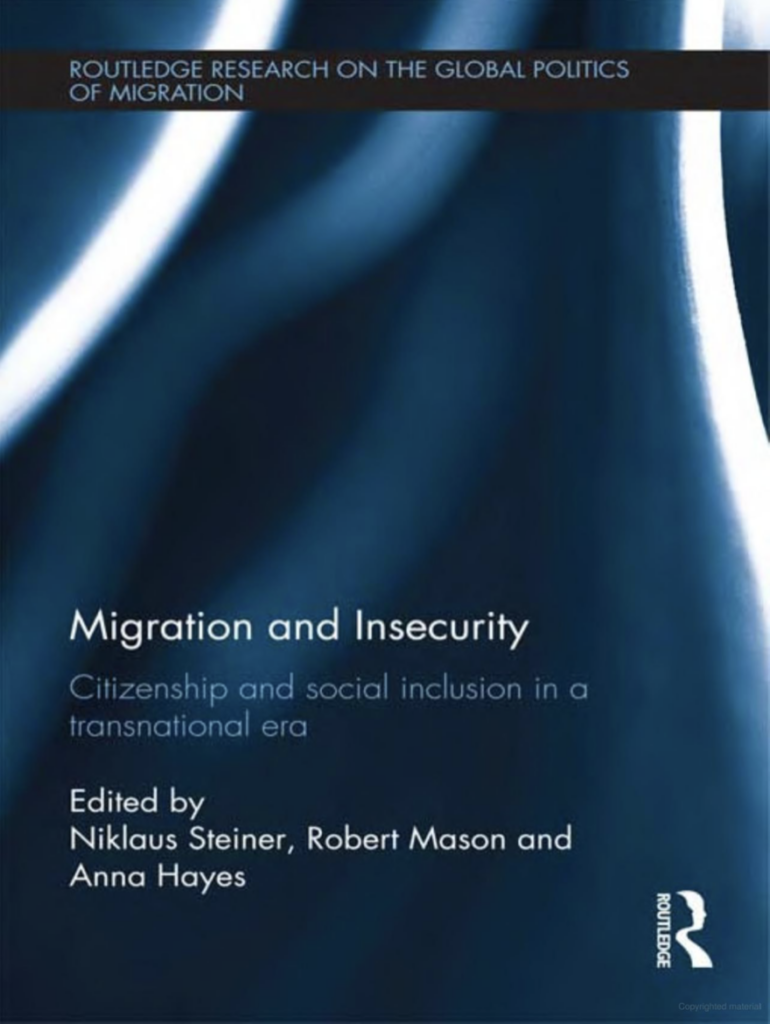
This book presents an inter-disciplinary investigation into contemporary migration and social inclusion through an examination of migrant and refugee experience.
In this edited volume, contributors discuss new understandings of individual and community security in a world where legal borders and definitions of citizenship no longer adequately capture the reality of migration. Distinguished contributors approach questions of social belonging and inclusion from diverse perspectives. Drawing its primary examples from Australia, Migration and Insecurity is framed by the wider experience of the Global North, with examples from Europe, the United Kingdom and United States woven throughout the collection. An inter-disciplinary approach to migration studies, this book integrates local, national and transnational spaces in its discussion of new constructs of inclusion and security. It considers questions of historical memory, ontological security, transnational communities, the role of civic institutions and social relationships in local spaces to guide the reader towards the wider conceptual questions of migration studies using expertise from the fields of sociology, gender, historical and political studies.
Migration and Insecurity: Citizenship and Social Inclusion in a Transnational Era. Niklaus Steiner, Robert Mason and Anna Hayes eds. (NY: Routledge, 2013).
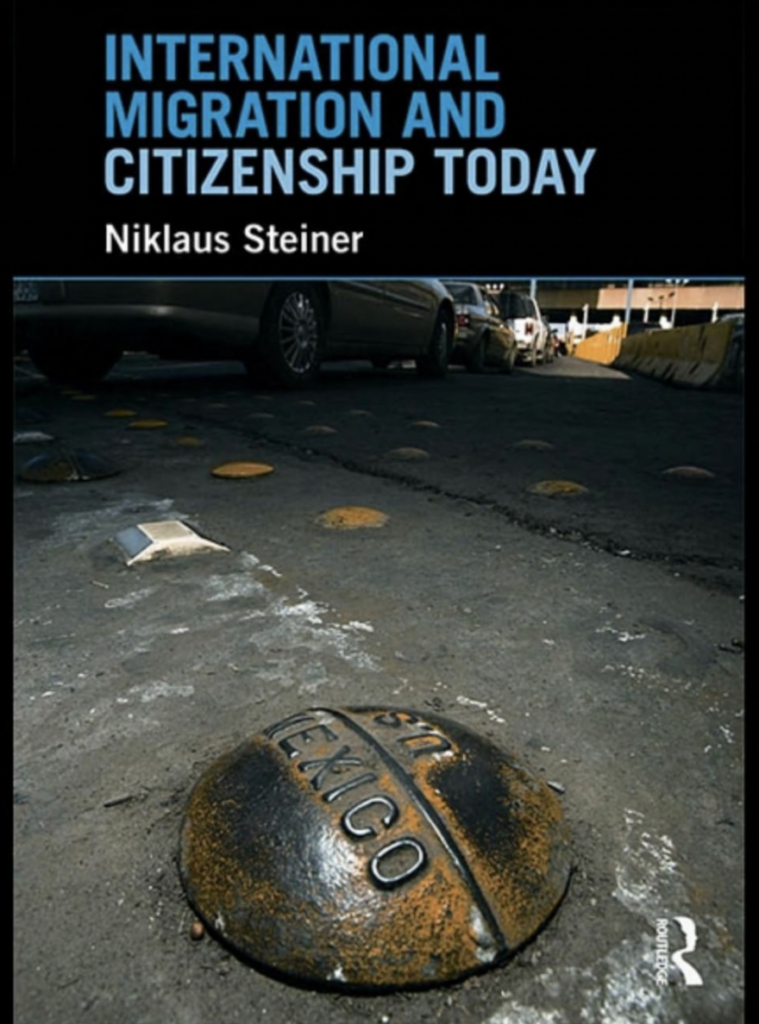
International migration has emerged in the last decade as one of the world’s most controversial and pressing issues. This thought-provoking textbook offers the reader a more nuanced and knowledgeable understanding of the complex economic, political, cultural, and moral concerns that arise when people move across borders seeking admission into other countries. Splitting the text into five broad sections, Steiner facilitates easy navigation of the complex discussions that surround the issue of migration:
Section I – Introduction: examines how the central questions that frame the book will be addressed, including: What criteria should be used to admit migrants? and How should a country grant citizenship?
Section II – Immigrants: discusses the criteria for accepting immigrants, dealing with the unwanted, and assessing the economic, cultural and political impacts.
Section III – Refugees: evaluates the methods used to protect refugees, the controversies surrounding asylum and the shortcomings of current refugee definitions.
Section IV – Citizenship: charts the rise of nationalism, presents modern issues of minority rights and diversity, and examines processes of naturalization across the globe.
Section V – Conclusion: considers more unconventional approaches to migration and citizenship and suggests moving towards a more holistic approach.
Carefully constructed to spark discussion and student reflection and featuring suggested resources at the end of each section, this book offers dozens of contemporary examples and case studies from across the globe.
International Migration and Citizenship Today is essential reading for students not only of migration and citizenship, but also globalization, international relations, and democracies.
International Migration and Citizenship Today. Niklaus Steiner, (London: Routledge, 2009).
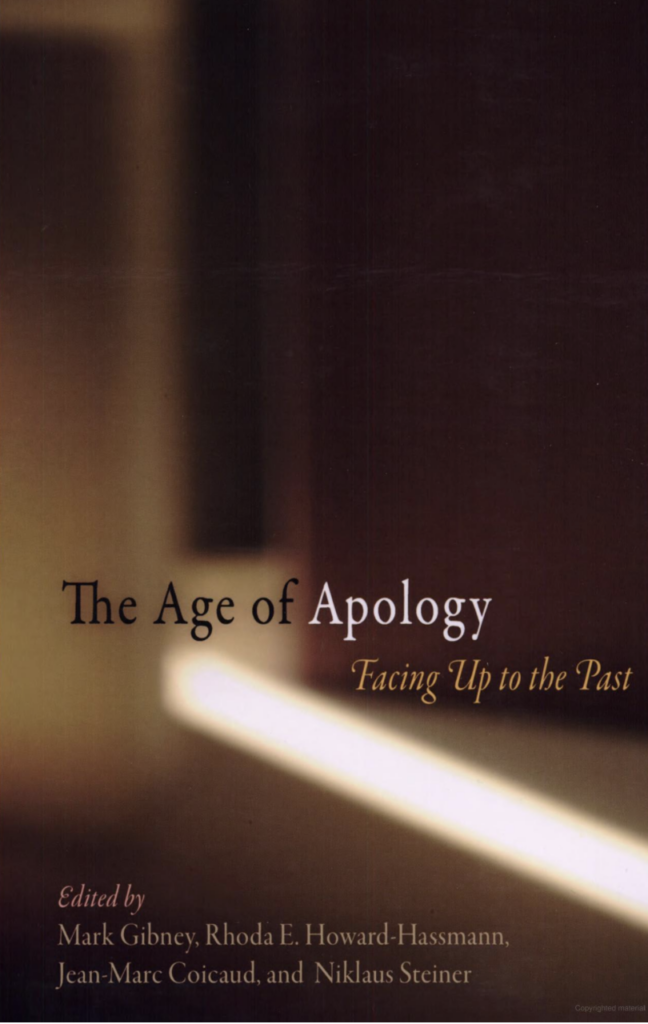
A number of Western states and institutions have sought to come to terms with their relationships to non-Western states and peoples. Powerful actors and institutions are apologizing to the relatively powerless. What do these apologies mean? Are they an indication of a new international order, either politically or as they relate to international law? Or are these apologies fleeting and insignificant? In The Age of Apology twenty-two law, politics, and human rights scholars explore the legal, political, social, historical, moral, religious, and anthropological aspects of Western apologies in an attempt to answer these questions. Conversely, a nonapology might be as important to study, and several chapters discuss the absence or refusal of apology and how this might be interpreted.
The Age of Apology: Facing Up to the Past. Mark Gibney, Rhoda E. Howard-Hassmann, Jean-Marc Coicaud and Niklaus Steiner, eds., (Philadelphia: University of Pennsylvania Press, 2008).
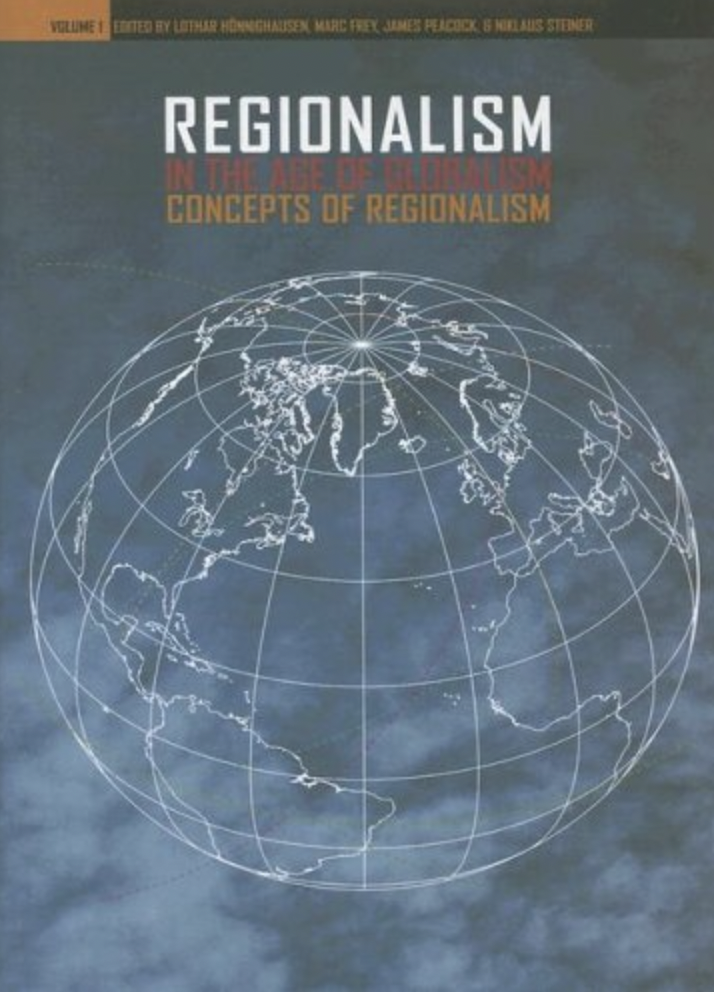
In an age of rapid globalization, regionalism might seem a notion better suited to the nineteenth century than the early twenty-first. Yet, regionalism has actually flourished in the last half-century. An increasing number of conflicts are based on territorial identities, while new regionally based political, economic, cultural, and religious groupings have emerged.
These two volumes examine regionalism in today’s rapidly shrinking world. The first volume, Concepts of Regionalism,showcases the wide range of theories and methods being applied to regionalism in the humanities and social sciences. Many common themes emerge, most importantly that regions are social and cultural constructs.
Regionalism in the Age of Globalism, Volume 1: Concepts of Regionalism. Lothar Honnighausen, Mark Frey, James Peacock, and Niklaus Steiner, eds., (Madison Wisconsin: Wisconsin University Press, 2005).
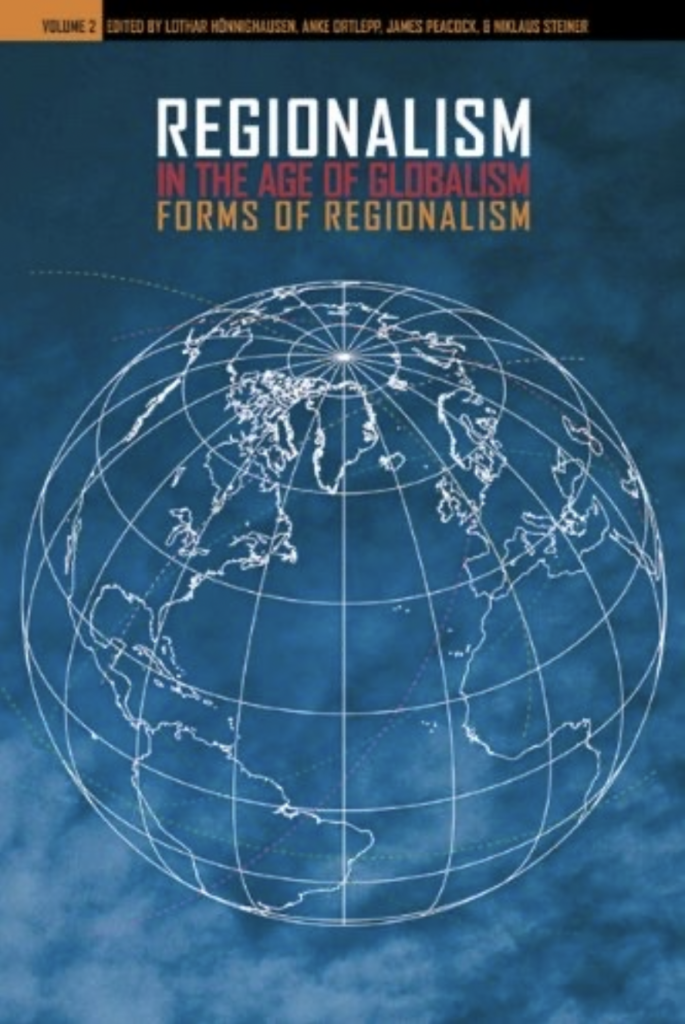
In an age of rapid globalization, regionalism might seem a notion better suited to the nineteenth century than the early twenty-first. Yet, regionalism has actually flourished in the last half-century. An increasing number of conflicts are based on territorial identities, while new regionally based political, economic, cultural, and religious groupings have emerged.
These two volumes examine regionalism in today’s rapidly shrinking world. The second volume, Forms of Regionalism, presents case studies that explore regionalism in literature, governmental policy, architecture, and other fields in areas as diverse as the American South, Pacific Northwest, Eastern Europe, and the Canadian North.
Regionalism in the Age of Globalism, Volume 2: Forms of Regionalism. Lothar Honnighausen, Anke Ortlepp James Peacock, and Niklaus Steiner, eds., (Madison Wisconsin: Wisconsin University Press, 2005).
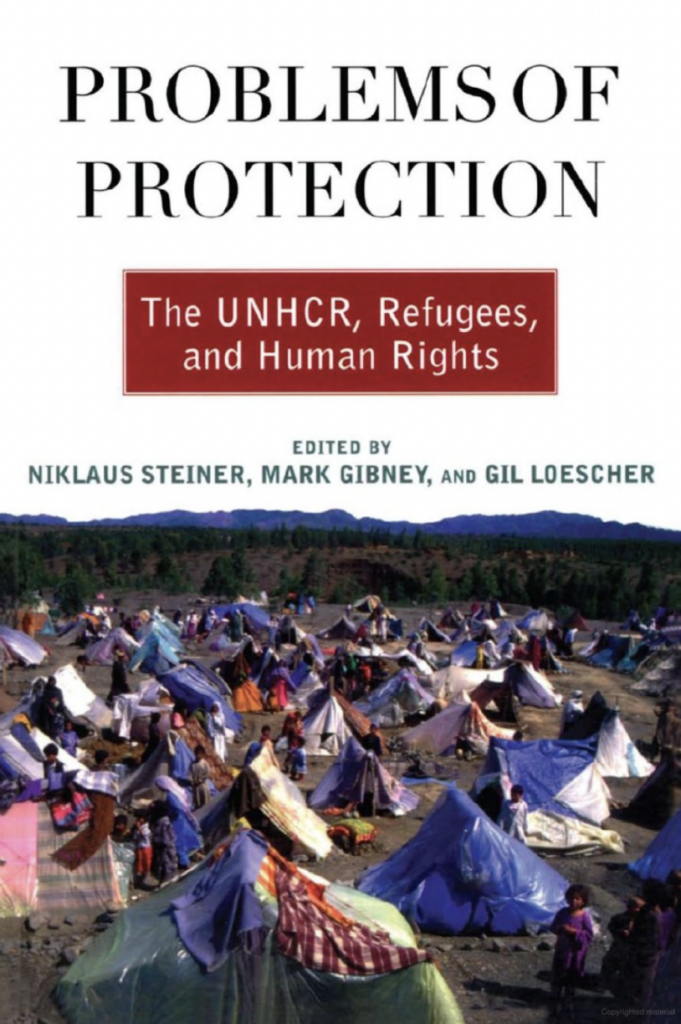
Of all the humanitarian impulses in world politics today, one of the most widely recognized is the need to protect refugees. However, as The Problems of Protection explores, what on the surface appears to be a simple proposition can quickly become complex and controversial. This complexity results in troubling variation in how we respond to our obligation to protect refugees–while NATO launches a major military intervention on behalf of Albanians in Kosovo amidst worldwide media attention, the international community’s response to Sierra Leonean refugees is slow, inefficient and inadequate. Who qualifies as a refugee in need of protection? Should refugees be returned as soon as possible, or integrated into safer host countries? The contributors to this volume address the often lacking political will among powerful countries and donors, shifting attitudes among affected countries, and the difficulty of rebuilding societies in a world in which the number of refugees will almost certainly continue to increase.
Problems of Protection: UNHCR, Refugees, and Human Rights. Niklaus Steiner, Mark Gibney and Gil Loescher, eds., (New York, Routledge Press, 2003).
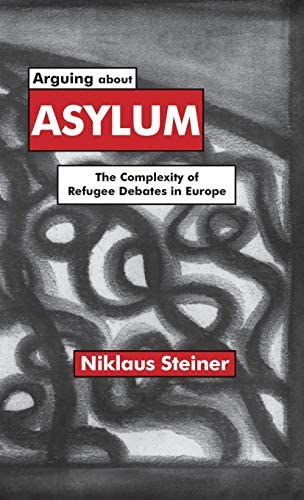
In addressing the asylum controversy in Europe today, much of the literature assumes that asylum policies result from the struggle between national interest arguing to tighten asylum and humanitarianism arguing to loosen it. This book challenges this simple tug-of-war image by examining asylum in Germany, Switzerland, and Britain from the late 1970s to the mid 1990s. The findings reveal the complex and often counter-intuitive roles national interest, international norms, and morality play in shaping asylum. It forces us to reconsider how we think about asylum and to explore alternatives to conventional assumptions.
Arguing about Asylum: The Complexity of Refugee Debates in Europe. Niklaus Steiner, (New York: St. Martin’s Press 2000).
Articles
“To Diversify, Global Education Needs a Fundamental Shift in Mindset and Practice,” global-e: Reflections on Global Studies vol. 12, n. 42 September 2019. I am also the guest editor of their series “Diversifying Global Education.”
“Diversifying Global Education Through Cocurricular Global Experiences,” NAFSA Research Symposium Series: A Critical Discussion of Theories, Methodologies, and Practices in International Education vol. 3, May 2019
“International Internships: Establishing Better Rules for the Game,” International Educator with Peter Coclanis and Robert Miles. vol. 21, November-December 2012
Book Review of The Ethics and Politics of Asylum: Liberal Democracy and the Response to Refugees by Matthew Gibney The International History Review vol. 28, n. 3 September 2006
“Immigration’s Test for Us All,” The Raleigh News & Observer Op/Ed February 16, 2006
Book Review of Open Borders: The Case Against Immigration Control by Teresa Hayter in International Migration Review vol. 37, Winter 2003
“Arguing About International Legal Norms in Refugee Debates,” Global Society vol. 13, n. 3 July 1999
“Moral Arguments in Asylum Debates,” International Politics vol. 36, n.1 March 1999
“Political Asylum in Germany: International Norms and Domestic Politics,” with John Bendix German Politics and Society vol. 16, n. 2 Summer 1998